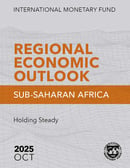At a Glance
- Current IMF membership: 191 countries
- Mozambique Joined the Fund in September 24, 1984; Article XIV.
- The Government of Mozambique has notified the International Monetary Fund (IMF) that it has accepted the obligations of Article VIII, Sections 2, 3, and 4 of the IMF Articles of Agreement, effective May 20, 2011.
- Total Quotas: SDR 227.2 million
- Outstanding Purchases and Loans: SDR 183.18 million (June 30, 2019)
- Last Article IV Consultation: The 2019 Article IV consultation staff report was discussed by the Executive Board on June 3, 2019. (Country Report No. 19/166)
Office Activities
Resident Representative News (português)
May 28, 2025
Roundtable Discussion on Youth, Employment, and Growth, held on May 28, 2025, in Maputo.
Resident Representative Olamide Harrison delivered the following REO Chapter Presentation: The Clock is Ticking—Tackling Sub-Saharan Africa’s Urgent Job Creation Challenge. The presentation was followed by a roundtable discussion with subject experts.
May 28, 2025
2025-05- REO ppt outreach MOZ - PT (português)
May 21, 2025
Resident Representative Olamide Harrison delivers the following REO presentation in Maputo: Recuperação Interrompida (in Portuguese only).
May 21, 2025
Economic Growth in Mozambique: the Role of Human Capital
Economic Growth in Mozambique: the role of Human Capital (available in Portuguese only) delivered on February 16, 2023 in Maputo at the Trade, Industry and Services Association (ACIS) Workshop.
February 16, 2023
IMF's Work on Mozambique
No results found. Either there was an error with the web service or there is no data returned by the web service.
Regional Economic Outlook
October 16, 2025

The outlook for Sub-Saharan Africa is showing resilience, despite a challenging external environment with uneven prospects in commodity prices, still tight borrowing conditions, and a deterioration of the global trade and aid landscape.
Read the Report
Departmental Papers on Africa
 The Departmental African Paper Series covers research on sub-Saharan Africa conducted by International Monetary Fund (IMF) staff, particularly on issues of broad regional or cross-country interest. The views expressed in these papers are those of the author(s) and do not necessarily represent the views of the IMF, its Executive Board, or IMF Management.
The Departmental African Paper Series covers research on sub-Saharan Africa conducted by International Monetary Fund (IMF) staff, particularly on issues of broad regional or cross-country interest. The views expressed in these papers are those of the author(s) and do not necessarily represent the views of the IMF, its Executive Board, or IMF Management.



